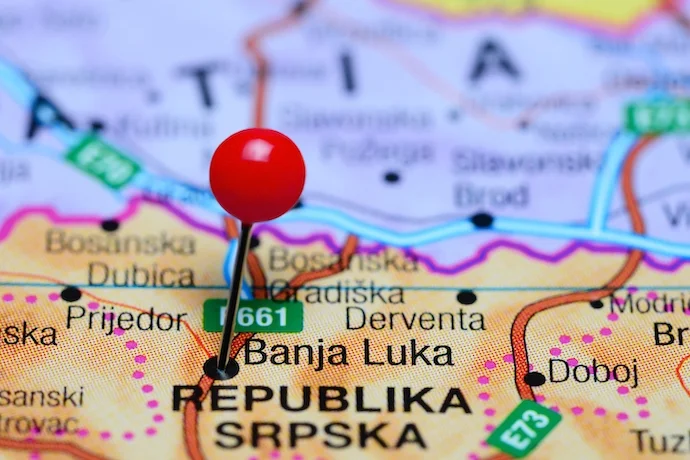
Navigating Ethnic Tensions and Fragile Alliances in Bosnia and Herzegovina
Banja Luka, the administrative heart of Republika Srpska, has become the epicenter of deepening ethnic and political tensions in Bosnia and Herzegovina. Decades after the U.S.-brokered Dayton Agreement ended the Bosnian War (1992–95), the country remains a fragile mosaic of ethnic groups—Bosniaks (Bosnian Muslims), Croats, and Serbs—governed by a labyrinthine power-sharing structure that mirrors both the war’s legacy and ongoing divisions.
Under the Dayton framework, Bosnia and Herzegovina comprises two main entities: the Federation of Bosnia and Herzegovina, predominantly home to Bosniaks and Croats, and Republika Srpska, largely Serb. The Federation’s capital, Sarajevo, symbolizes the aspirations for unity, while Republika Srpska’s administrative center, Banja Luka, epitomizes division and resistance.
Republika Srpska, led by nationalist politicians such as Milorad Dodik, has entrenched itself as a bastion of separatist sentiment. Dodik, Republika Srpska’s president, has spent years pursuing a secessionist agenda that undermines the Dayton Accords, frequently advocating for independence. While most experts contend that outright independence or union with Serbia remains unlikely, Dodik’s actions highlight the precariousness of Bosnia’s fragile equilibrium.
In recent months, Dodik’s administration’s legislative efforts to erode state-level institutions have intensified fears that Republika Srpska may push for independence. These maneuvers have alarmed Bosniaks and Croats in the Federation and drawn international condemnation as direct threats to Bosnia’s territorial integrity. Simultaneously, the Federation grapples with its own internal discord, as Croat leaders accuse Bosniaks of political marginalization and demand a third entity—a proposal fiercely opposed by Bosniaks, who see it as a step toward further ethnic fragmentation.
Bosnia’s internal divisions also manifest prominently in its foreign policy stances. Sarajevo’s pro-Western orientation frequently clashes with Banja Luka’s alignment with Moscow. For example, following Russia’s 2022 invasion of Ukraine, Bosnia’s federal government supported Kyiv, while Republika Srpska sided with Moscow. These stark contrasts underscore the extent to which broader geopolitical currents shape Bosnia’s domestic politics.
 Global events, such as Israel’s war in Gaza, further amplify Bosnia’s internal polarization. Although the conflict has not precipitated significant political shifts within Bosnia, a prevailing pro-Palestinian sentiment unites the country’s diverse ethnic communities. However, this shared perspective does little to mend the deep-seated divisions within the state.
Global events, such as Israel’s war in Gaza, further amplify Bosnia’s internal polarization. Although the conflict has not precipitated significant political shifts within Bosnia, a prevailing pro-Palestinian sentiment unites the country’s diverse ethnic communities. However, this shared perspective does little to mend the deep-seated divisions within the state.
A more profound struggle over identity and history underpins Bosnia’s political and administrative clashes. The atrocities committed in Srebrenica in 1995—deemed genocide by international courts—remain a contentious issue, particularly among Bosnian Serbs. Ethnic nationalism continues to dominate political discourse, with leaders on all sides weaponizing historical narratives to consolidate their constituencies, hindering reconciliation efforts and perpetuating Bosnia’s fragmented political system.
This entrenched political stagnation has far-reaching economic repercussions. Many young people, disillusioned by limited opportunities and entrenched nationalism, are emigrating in search of better prospects. The resulting brain drain further weakens Bosnia’s social and economic fabric, leaving the country ill-prepared to address its manifold challenges.
External actors compound Bosnia’s troubles. Russia’s expanding influence in Republika Srpska has raised alarms about the stability of the Western Balkans. Bosnia’s NATO aspirations—strongly supported by Bosniaks and Croats but staunchly opposed by Serb leaders—have turned the nation into a geopolitical battleground between Western interests and Russian ambitions. While NATO integration offers a pathway to stability, Republika Srpska’s resistance reflects Moscow’s broader strategy of curbing Western influence in the region.
The international community’s response has been inconsistent and, at times, ineffectual. While the European Union and the United States have denounced Dodik’s rhetoric and imposed limited sanctions, critics argue that these measures lack sufficient force. The Office of the High Representative (OHR), tasked with overseeing the implementation of the Dayton Accords, remains a polarizing institution, with Republika Srpska questioning its legitimacy and advocating for its dissolution.
Regional dynamics further complicate Bosnia’s future. Serbia’s nationalist ambitions, encapsulated in its “all-Serb declaration,” directly challenge the post-Dayton settlement and escalate tensions in Bosnia and Kosovo. While the outgoing Biden administration has successfully curbed some of Belgrade’s more aggressive moves, the incoming Trump administration raises concerns of destabilization, including renewed support for divisive proposals like a Serbia-Kosovo land swap and the rollback of sanctions against Bosnian Serb separatists.
Bosnia and Herzegovina stands at a pivotal crossroads. Ethnic tensions, political fragmentation, and external pressures threaten to unravel the fragile peace established in 1995. Without renewed commitment to dialogue and substantive reforms, Bosnia risks sliding back into instability—a scenario with dire implications for the Balkans and beyond. To secure lasting peace, the European Union must assume greater responsibility for stabilizing the Western Balkans and developing independent deterrence mechanisms that do not rely solely on U.S. foreign policy.
As many Bosnian Serbs continue to aspire to a “Greater Serbia,” the path forward requires Bosnia to confront its unresolved tensions and fragile alliances head-on. Only through compromise, reform, and unity can the nation hope to forge a stable and prosperous future.
